Business Strategy Analysis: InterContinental Hotel Group Report
VerifiedAdded on 2023/01/10
|12
|3909
|79
Report
AI Summary
This report provides a detailed analysis of the business strategy of the InterContinental Hotel Group (IHG). It begins with an introduction to business strategy and its importance, followed by an examination of the macroenvironment using PESTLE analysis, considering political, economic, social, technological, legal, and environmental factors affecting IHG's operations. The report then delves into IHG's internal capabilities, utilizing SWOT and VRIO analyses to assess its strengths, weaknesses, opportunities, threats, valuable resources, rarity, imitability, and organizational structure. Subsequently, it elaborates on Porter's Five Forces model to evaluate the competitive landscape within the hospitality industry. Finally, the report culminates in the production of a strategic management plan, outlining IHG's strategy, vision, and mission to enhance its market position and achieve sustainable growth. The report emphasizes the impact of these strategic elements on IHG's performance within the global hospitality sector.
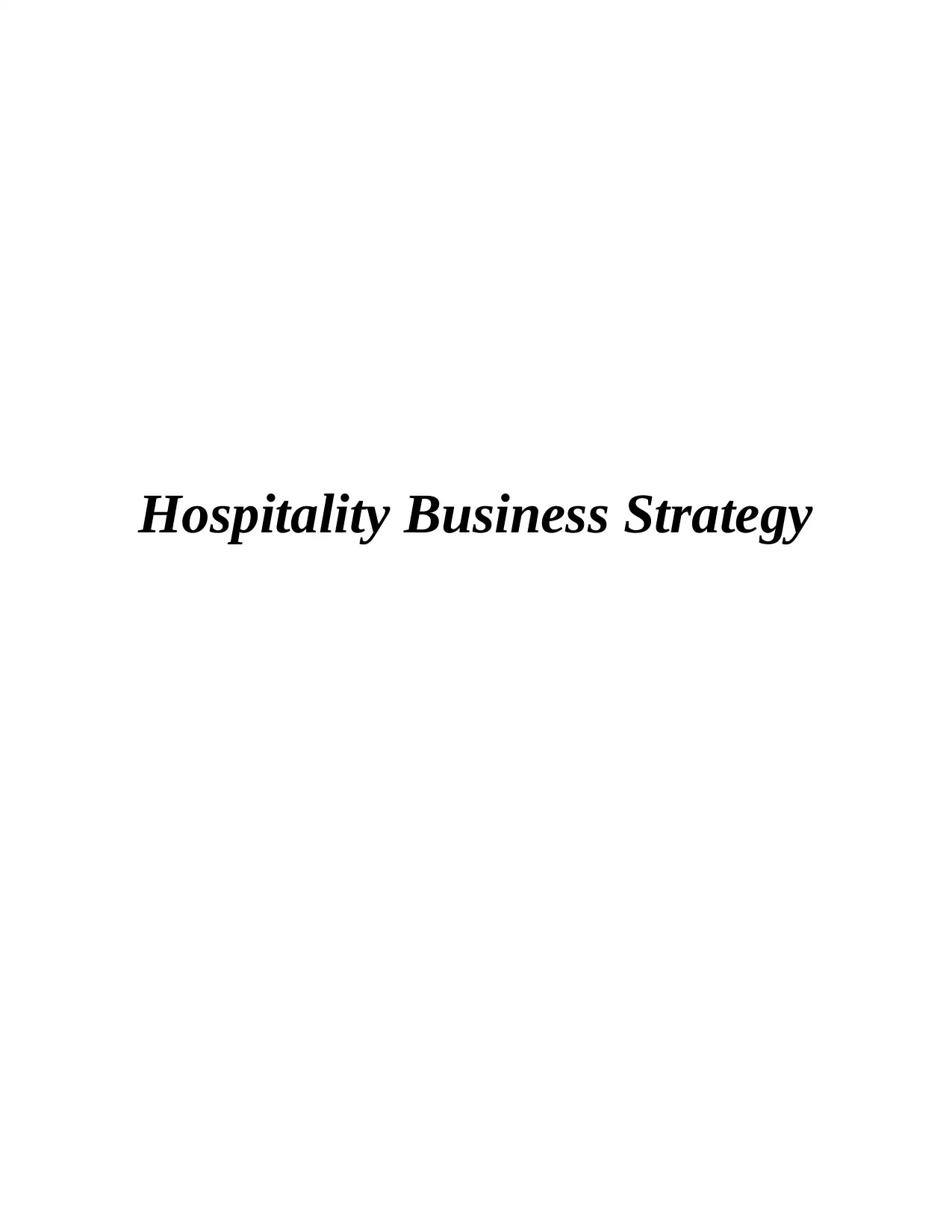
Hospitality Business Strategy
Paraphrase This Document
Need a fresh take? Get an instant paraphrase of this document with our AI Paraphraser
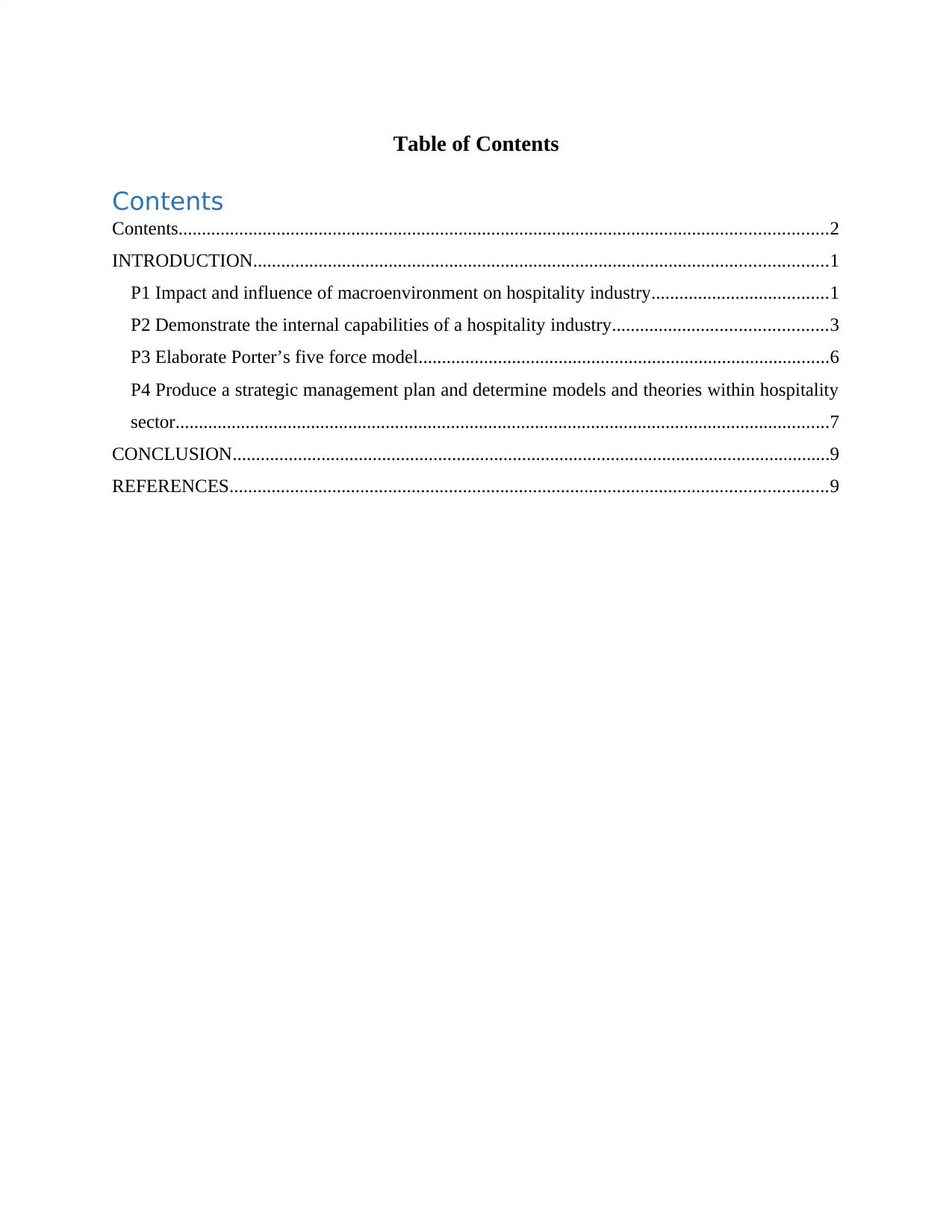
Table of Contents
Contents
Contents...........................................................................................................................................2
INTRODUCTION...........................................................................................................................1
P1 Impact and influence of macroenvironment on hospitality industry......................................1
P2 Demonstrate the internal capabilities of a hospitality industry..............................................3
P3 Elaborate Porter’s five force model........................................................................................6
P4 Produce a strategic management plan and determine models and theories within hospitality
sector............................................................................................................................................7
CONCLUSION................................................................................................................................9
REFERENCES................................................................................................................................9
Contents
Contents...........................................................................................................................................2
INTRODUCTION...........................................................................................................................1
P1 Impact and influence of macroenvironment on hospitality industry......................................1
P2 Demonstrate the internal capabilities of a hospitality industry..............................................3
P3 Elaborate Porter’s five force model........................................................................................6
P4 Produce a strategic management plan and determine models and theories within hospitality
sector............................................................................................................................................7
CONCLUSION................................................................................................................................9
REFERENCES................................................................................................................................9
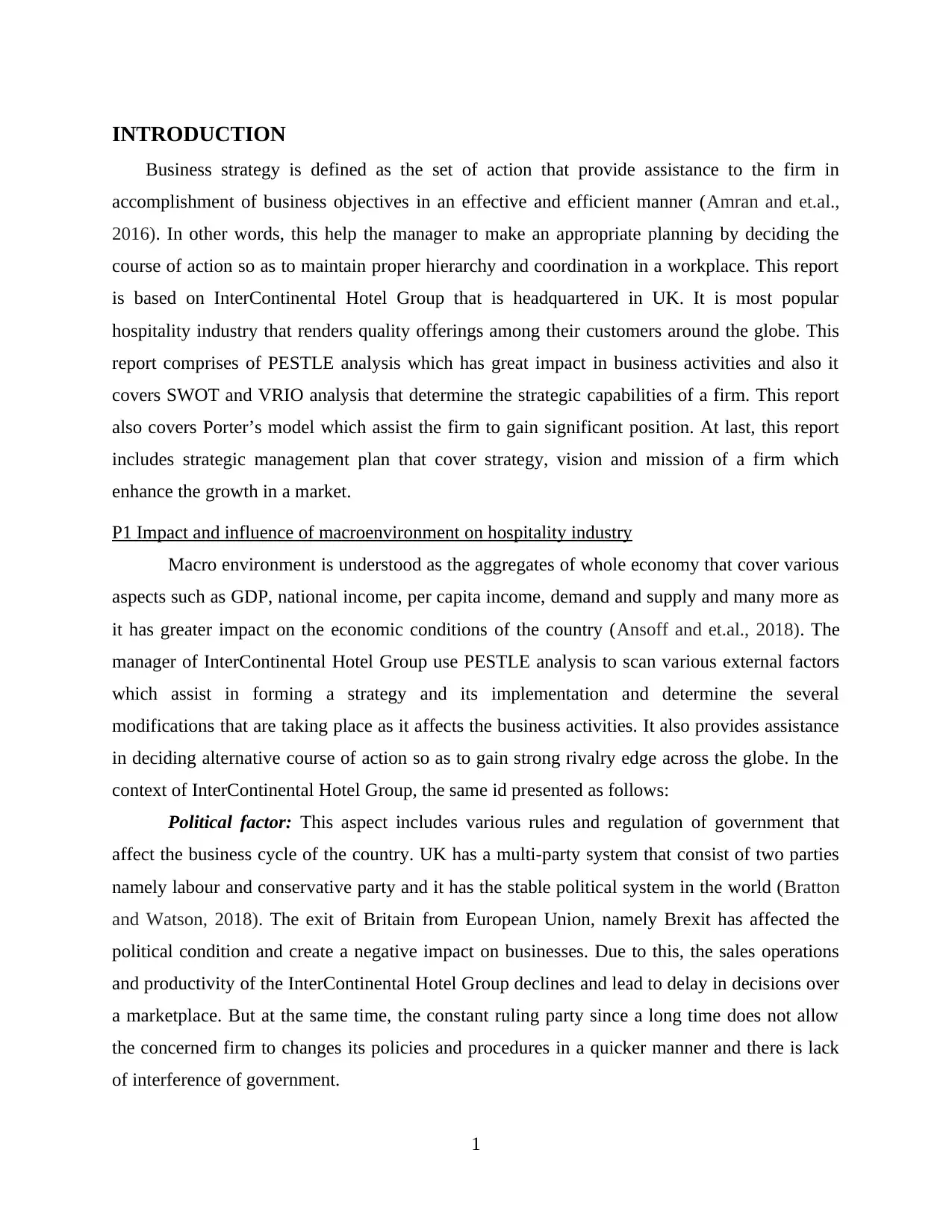
INTRODUCTION
Business strategy is defined as the set of action that provide assistance to the firm in
accomplishment of business objectives in an effective and efficient manner (Amran and et.al.,
2016). In other words, this help the manager to make an appropriate planning by deciding the
course of action so as to maintain proper hierarchy and coordination in a workplace. This report
is based on InterContinental Hotel Group that is headquartered in UK. It is most popular
hospitality industry that renders quality offerings among their customers around the globe. This
report comprises of PESTLE analysis which has great impact in business activities and also it
covers SWOT and VRIO analysis that determine the strategic capabilities of a firm. This report
also covers Porter’s model which assist the firm to gain significant position. At last, this report
includes strategic management plan that cover strategy, vision and mission of a firm which
enhance the growth in a market.
P1 Impact and influence of macroenvironment on hospitality industry
Macro environment is understood as the aggregates of whole economy that cover various
aspects such as GDP, national income, per capita income, demand and supply and many more as
it has greater impact on the economic conditions of the country (Ansoff and et.al., 2018). The
manager of InterContinental Hotel Group use PESTLE analysis to scan various external factors
which assist in forming a strategy and its implementation and determine the several
modifications that are taking place as it affects the business activities. It also provides assistance
in deciding alternative course of action so as to gain strong rivalry edge across the globe. In the
context of InterContinental Hotel Group, the same id presented as follows:
Political factor: This aspect includes various rules and regulation of government that
affect the business cycle of the country. UK has a multi-party system that consist of two parties
namely labour and conservative party and it has the stable political system in the world (Bratton
and Watson, 2018). The exit of Britain from European Union, namely Brexit has affected the
political condition and create a negative impact on businesses. Due to this, the sales operations
and productivity of the InterContinental Hotel Group declines and lead to delay in decisions over
a marketplace. But at the same time, the constant ruling party since a long time does not allow
the concerned firm to changes its policies and procedures in a quicker manner and there is lack
of interference of government.
1
Business strategy is defined as the set of action that provide assistance to the firm in
accomplishment of business objectives in an effective and efficient manner (Amran and et.al.,
2016). In other words, this help the manager to make an appropriate planning by deciding the
course of action so as to maintain proper hierarchy and coordination in a workplace. This report
is based on InterContinental Hotel Group that is headquartered in UK. It is most popular
hospitality industry that renders quality offerings among their customers around the globe. This
report comprises of PESTLE analysis which has great impact in business activities and also it
covers SWOT and VRIO analysis that determine the strategic capabilities of a firm. This report
also covers Porter’s model which assist the firm to gain significant position. At last, this report
includes strategic management plan that cover strategy, vision and mission of a firm which
enhance the growth in a market.
P1 Impact and influence of macroenvironment on hospitality industry
Macro environment is understood as the aggregates of whole economy that cover various
aspects such as GDP, national income, per capita income, demand and supply and many more as
it has greater impact on the economic conditions of the country (Ansoff and et.al., 2018). The
manager of InterContinental Hotel Group use PESTLE analysis to scan various external factors
which assist in forming a strategy and its implementation and determine the several
modifications that are taking place as it affects the business activities. It also provides assistance
in deciding alternative course of action so as to gain strong rivalry edge across the globe. In the
context of InterContinental Hotel Group, the same id presented as follows:
Political factor: This aspect includes various rules and regulation of government that
affect the business cycle of the country. UK has a multi-party system that consist of two parties
namely labour and conservative party and it has the stable political system in the world (Bratton
and Watson, 2018). The exit of Britain from European Union, namely Brexit has affected the
political condition and create a negative impact on businesses. Due to this, the sales operations
and productivity of the InterContinental Hotel Group declines and lead to delay in decisions over
a marketplace. But at the same time, the constant ruling party since a long time does not allow
the concerned firm to changes its policies and procedures in a quicker manner and there is lack
of interference of government.
1
⊘ This is a preview!⊘
Do you want full access?
Subscribe today to unlock all pages.

Trusted by 1+ million students worldwide
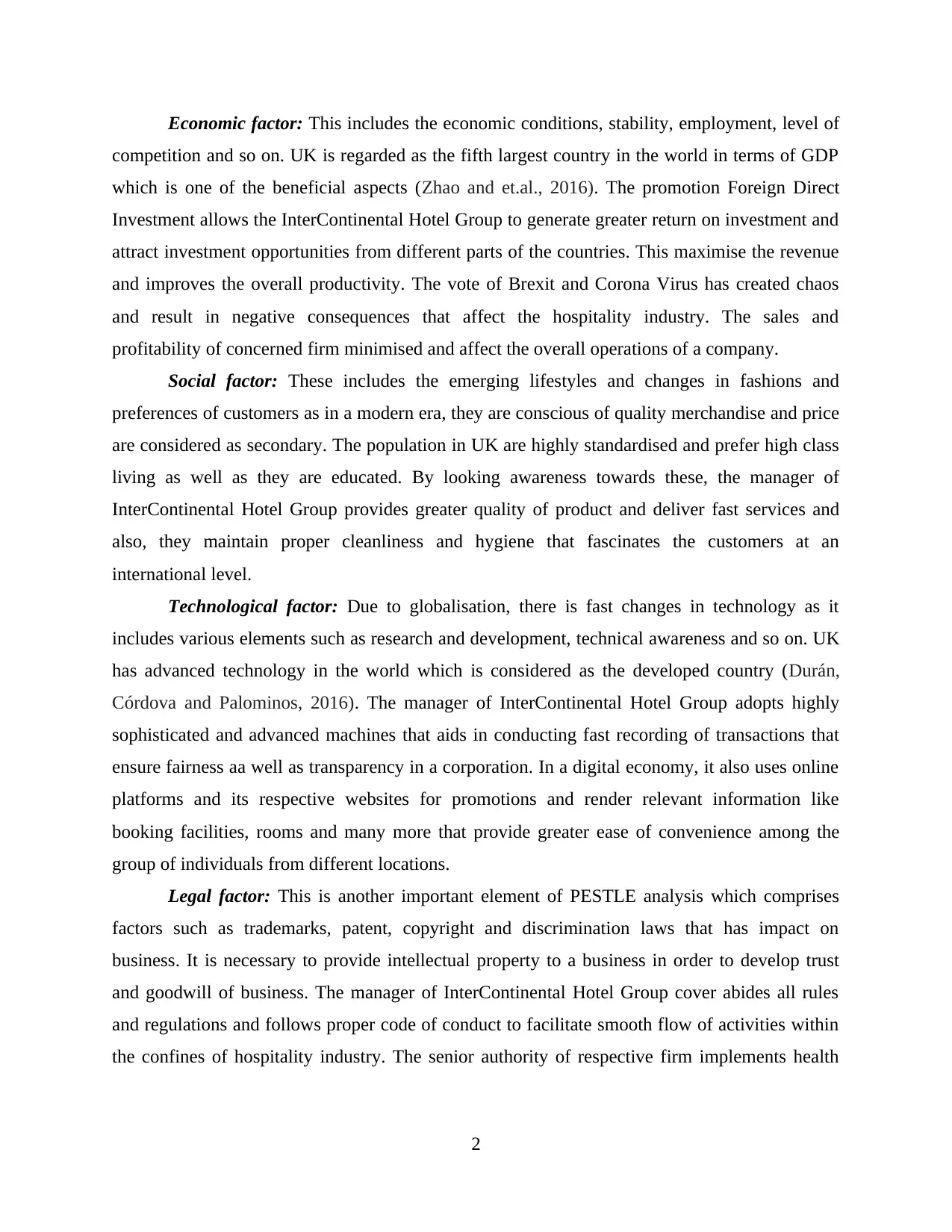
Economic factor: This includes the economic conditions, stability, employment, level of
competition and so on. UK is regarded as the fifth largest country in the world in terms of GDP
which is one of the beneficial aspects (Zhao and et.al., 2016). The promotion Foreign Direct
Investment allows the InterContinental Hotel Group to generate greater return on investment and
attract investment opportunities from different parts of the countries. This maximise the revenue
and improves the overall productivity. The vote of Brexit and Corona Virus has created chaos
and result in negative consequences that affect the hospitality industry. The sales and
profitability of concerned firm minimised and affect the overall operations of a company.
Social factor: These includes the emerging lifestyles and changes in fashions and
preferences of customers as in a modern era, they are conscious of quality merchandise and price
are considered as secondary. The population in UK are highly standardised and prefer high class
living as well as they are educated. By looking awareness towards these, the manager of
InterContinental Hotel Group provides greater quality of product and deliver fast services and
also, they maintain proper cleanliness and hygiene that fascinates the customers at an
international level.
Technological factor: Due to globalisation, there is fast changes in technology as it
includes various elements such as research and development, technical awareness and so on. UK
has advanced technology in the world which is considered as the developed country (Durán,
Córdova and Palominos, 2016). The manager of InterContinental Hotel Group adopts highly
sophisticated and advanced machines that aids in conducting fast recording of transactions that
ensure fairness aa well as transparency in a corporation. In a digital economy, it also uses online
platforms and its respective websites for promotions and render relevant information like
booking facilities, rooms and many more that provide greater ease of convenience among the
group of individuals from different locations.
Legal factor: This is another important element of PESTLE analysis which comprises
factors such as trademarks, patent, copyright and discrimination laws that has impact on
business. It is necessary to provide intellectual property to a business in order to develop trust
and goodwill of business. The manager of InterContinental Hotel Group cover abides all rules
and regulations and follows proper code of conduct to facilitate smooth flow of activities within
the confines of hospitality industry. The senior authority of respective firm implements health
2
competition and so on. UK is regarded as the fifth largest country in the world in terms of GDP
which is one of the beneficial aspects (Zhao and et.al., 2016). The promotion Foreign Direct
Investment allows the InterContinental Hotel Group to generate greater return on investment and
attract investment opportunities from different parts of the countries. This maximise the revenue
and improves the overall productivity. The vote of Brexit and Corona Virus has created chaos
and result in negative consequences that affect the hospitality industry. The sales and
profitability of concerned firm minimised and affect the overall operations of a company.
Social factor: These includes the emerging lifestyles and changes in fashions and
preferences of customers as in a modern era, they are conscious of quality merchandise and price
are considered as secondary. The population in UK are highly standardised and prefer high class
living as well as they are educated. By looking awareness towards these, the manager of
InterContinental Hotel Group provides greater quality of product and deliver fast services and
also, they maintain proper cleanliness and hygiene that fascinates the customers at an
international level.
Technological factor: Due to globalisation, there is fast changes in technology as it
includes various elements such as research and development, technical awareness and so on. UK
has advanced technology in the world which is considered as the developed country (Durán,
Córdova and Palominos, 2016). The manager of InterContinental Hotel Group adopts highly
sophisticated and advanced machines that aids in conducting fast recording of transactions that
ensure fairness aa well as transparency in a corporation. In a digital economy, it also uses online
platforms and its respective websites for promotions and render relevant information like
booking facilities, rooms and many more that provide greater ease of convenience among the
group of individuals from different locations.
Legal factor: This is another important element of PESTLE analysis which comprises
factors such as trademarks, patent, copyright and discrimination laws that has impact on
business. It is necessary to provide intellectual property to a business in order to develop trust
and goodwill of business. The manager of InterContinental Hotel Group cover abides all rules
and regulations and follows proper code of conduct to facilitate smooth flow of activities within
the confines of hospitality industry. The senior authority of respective firm implements health
2
Paraphrase This Document
Need a fresh take? Get an instant paraphrase of this document with our AI Paraphraser
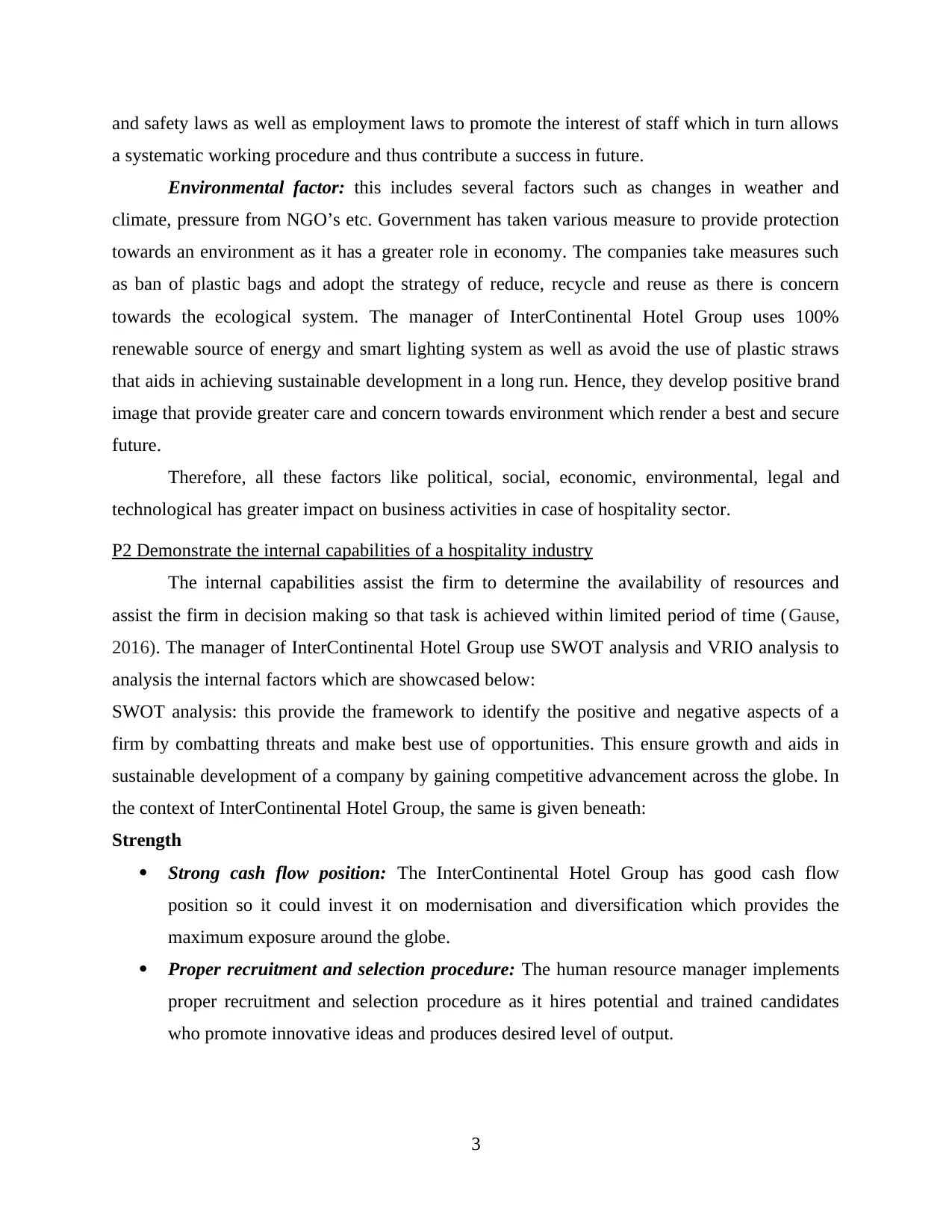
and safety laws as well as employment laws to promote the interest of staff which in turn allows
a systematic working procedure and thus contribute a success in future.
Environmental factor: this includes several factors such as changes in weather and
climate, pressure from NGO’s etc. Government has taken various measure to provide protection
towards an environment as it has a greater role in economy. The companies take measures such
as ban of plastic bags and adopt the strategy of reduce, recycle and reuse as there is concern
towards the ecological system. The manager of InterContinental Hotel Group uses 100%
renewable source of energy and smart lighting system as well as avoid the use of plastic straws
that aids in achieving sustainable development in a long run. Hence, they develop positive brand
image that provide greater care and concern towards environment which render a best and secure
future.
Therefore, all these factors like political, social, economic, environmental, legal and
technological has greater impact on business activities in case of hospitality sector.
P2 Demonstrate the internal capabilities of a hospitality industry
The internal capabilities assist the firm to determine the availability of resources and
assist the firm in decision making so that task is achieved within limited period of time (Gause,
2016). The manager of InterContinental Hotel Group use SWOT analysis and VRIO analysis to
analysis the internal factors which are showcased below:
SWOT analysis: this provide the framework to identify the positive and negative aspects of a
firm by combatting threats and make best use of opportunities. This ensure growth and aids in
sustainable development of a company by gaining competitive advancement across the globe. In
the context of InterContinental Hotel Group, the same is given beneath:
Strength
Strong cash flow position: The InterContinental Hotel Group has good cash flow
position so it could invest it on modernisation and diversification which provides the
maximum exposure around the globe.
Proper recruitment and selection procedure: The human resource manager implements
proper recruitment and selection procedure as it hires potential and trained candidates
who promote innovative ideas and produces desired level of output.
3
a systematic working procedure and thus contribute a success in future.
Environmental factor: this includes several factors such as changes in weather and
climate, pressure from NGO’s etc. Government has taken various measure to provide protection
towards an environment as it has a greater role in economy. The companies take measures such
as ban of plastic bags and adopt the strategy of reduce, recycle and reuse as there is concern
towards the ecological system. The manager of InterContinental Hotel Group uses 100%
renewable source of energy and smart lighting system as well as avoid the use of plastic straws
that aids in achieving sustainable development in a long run. Hence, they develop positive brand
image that provide greater care and concern towards environment which render a best and secure
future.
Therefore, all these factors like political, social, economic, environmental, legal and
technological has greater impact on business activities in case of hospitality sector.
P2 Demonstrate the internal capabilities of a hospitality industry
The internal capabilities assist the firm to determine the availability of resources and
assist the firm in decision making so that task is achieved within limited period of time (Gause,
2016). The manager of InterContinental Hotel Group use SWOT analysis and VRIO analysis to
analysis the internal factors which are showcased below:
SWOT analysis: this provide the framework to identify the positive and negative aspects of a
firm by combatting threats and make best use of opportunities. This ensure growth and aids in
sustainable development of a company by gaining competitive advancement across the globe. In
the context of InterContinental Hotel Group, the same is given beneath:
Strength
Strong cash flow position: The InterContinental Hotel Group has good cash flow
position so it could invest it on modernisation and diversification which provides the
maximum exposure around the globe.
Proper recruitment and selection procedure: The human resource manager implements
proper recruitment and selection procedure as it hires potential and trained candidates
who promote innovative ideas and produces desired level of output.
3
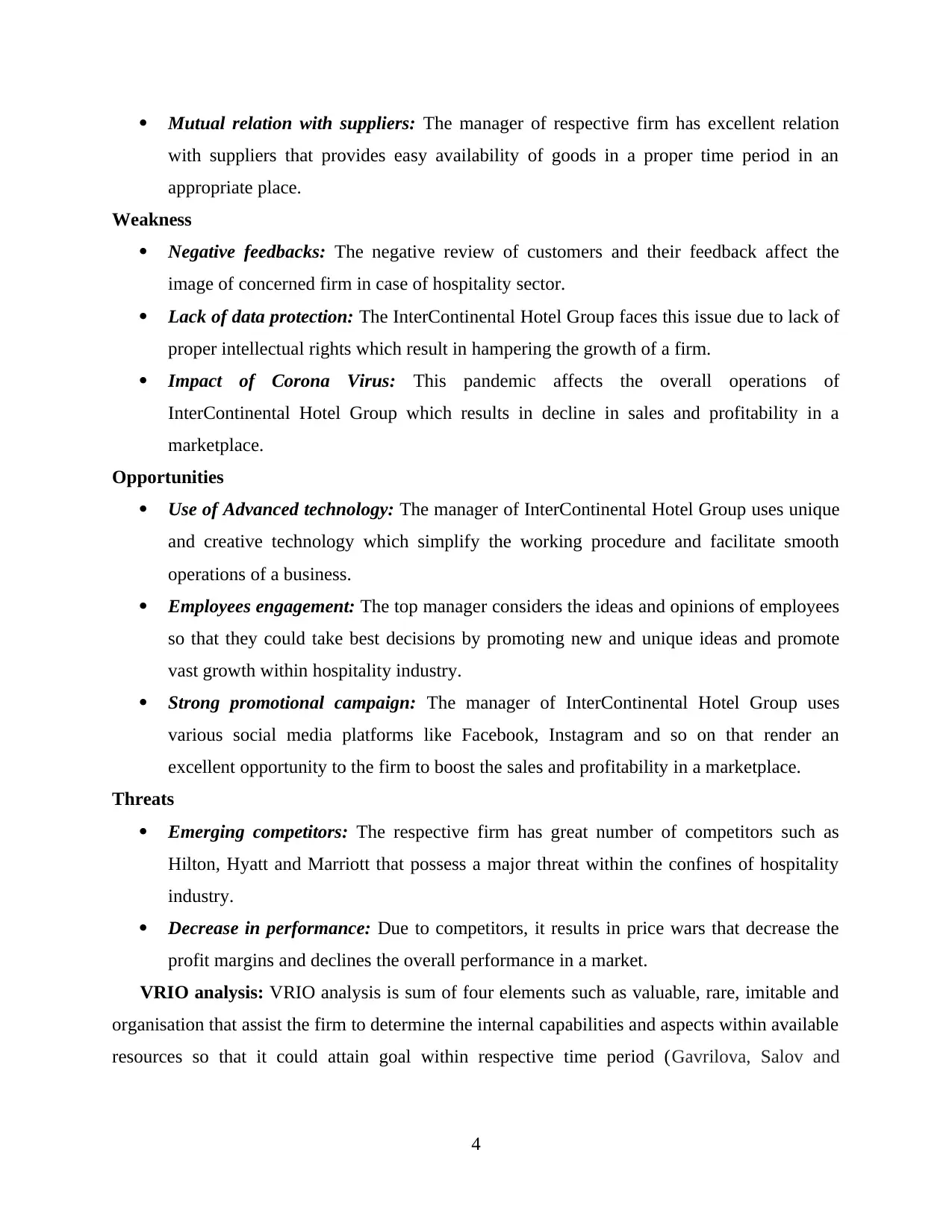
Mutual relation with suppliers: The manager of respective firm has excellent relation
with suppliers that provides easy availability of goods in a proper time period in an
appropriate place.
Weakness
Negative feedbacks: The negative review of customers and their feedback affect the
image of concerned firm in case of hospitality sector.
Lack of data protection: The InterContinental Hotel Group faces this issue due to lack of
proper intellectual rights which result in hampering the growth of a firm.
Impact of Corona Virus: This pandemic affects the overall operations of
InterContinental Hotel Group which results in decline in sales and profitability in a
marketplace.
Opportunities
Use of Advanced technology: The manager of InterContinental Hotel Group uses unique
and creative technology which simplify the working procedure and facilitate smooth
operations of a business.
Employees engagement: The top manager considers the ideas and opinions of employees
so that they could take best decisions by promoting new and unique ideas and promote
vast growth within hospitality industry.
Strong promotional campaign: The manager of InterContinental Hotel Group uses
various social media platforms like Facebook, Instagram and so on that render an
excellent opportunity to the firm to boost the sales and profitability in a marketplace.
Threats
Emerging competitors: The respective firm has great number of competitors such as
Hilton, Hyatt and Marriott that possess a major threat within the confines of hospitality
industry.
Decrease in performance: Due to competitors, it results in price wars that decrease the
profit margins and declines the overall performance in a market.
VRIO analysis: VRIO analysis is sum of four elements such as valuable, rare, imitable and
organisation that assist the firm to determine the internal capabilities and aspects within available
resources so that it could attain goal within respective time period (Gavrilova, Salov and
4
with suppliers that provides easy availability of goods in a proper time period in an
appropriate place.
Weakness
Negative feedbacks: The negative review of customers and their feedback affect the
image of concerned firm in case of hospitality sector.
Lack of data protection: The InterContinental Hotel Group faces this issue due to lack of
proper intellectual rights which result in hampering the growth of a firm.
Impact of Corona Virus: This pandemic affects the overall operations of
InterContinental Hotel Group which results in decline in sales and profitability in a
marketplace.
Opportunities
Use of Advanced technology: The manager of InterContinental Hotel Group uses unique
and creative technology which simplify the working procedure and facilitate smooth
operations of a business.
Employees engagement: The top manager considers the ideas and opinions of employees
so that they could take best decisions by promoting new and unique ideas and promote
vast growth within hospitality industry.
Strong promotional campaign: The manager of InterContinental Hotel Group uses
various social media platforms like Facebook, Instagram and so on that render an
excellent opportunity to the firm to boost the sales and profitability in a marketplace.
Threats
Emerging competitors: The respective firm has great number of competitors such as
Hilton, Hyatt and Marriott that possess a major threat within the confines of hospitality
industry.
Decrease in performance: Due to competitors, it results in price wars that decrease the
profit margins and declines the overall performance in a market.
VRIO analysis: VRIO analysis is sum of four elements such as valuable, rare, imitable and
organisation that assist the firm to determine the internal capabilities and aspects within available
resources so that it could attain goal within respective time period (Gavrilova, Salov and
4
⊘ This is a preview!⊘
Do you want full access?
Subscribe today to unlock all pages.

Trusted by 1+ million students worldwide
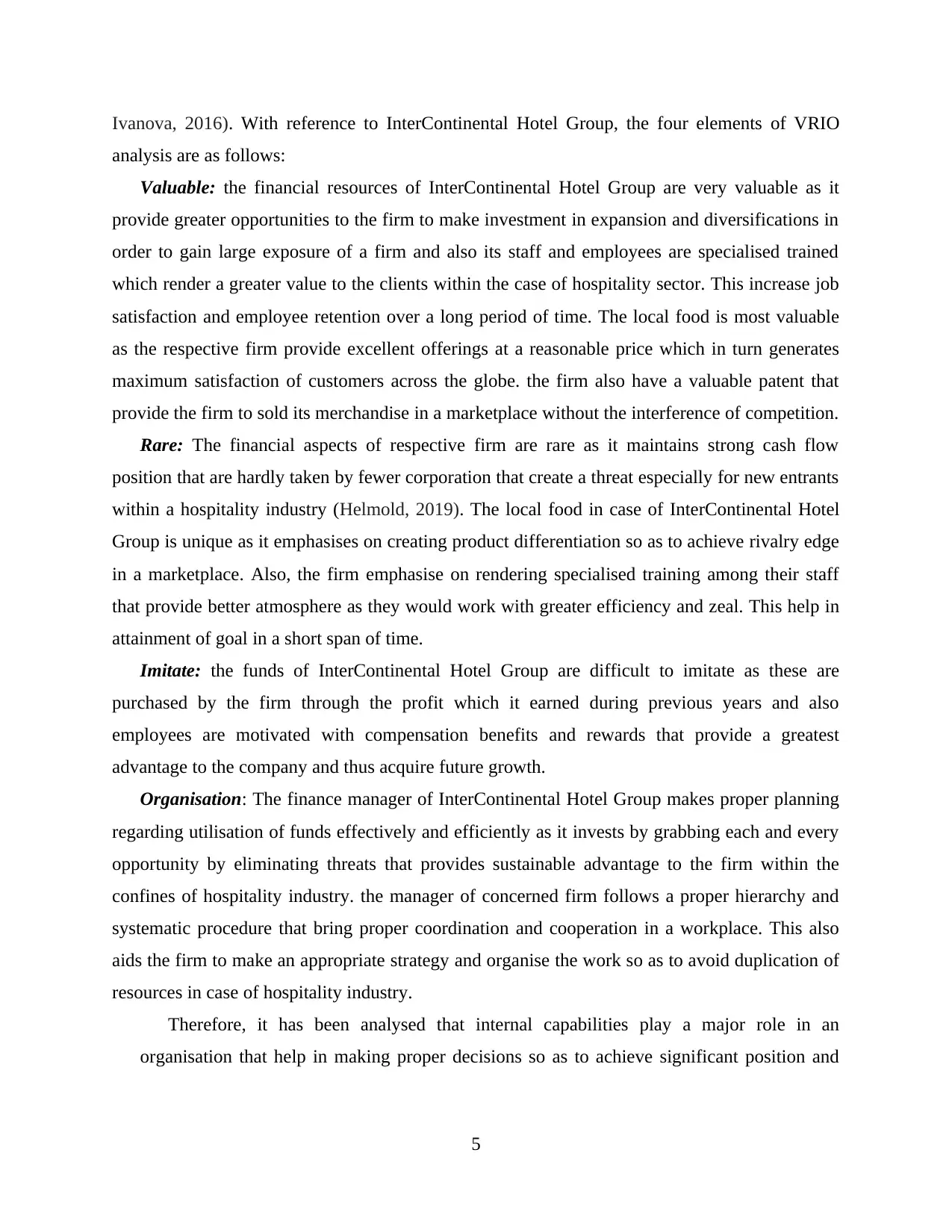
Ivanova, 2016). With reference to InterContinental Hotel Group, the four elements of VRIO
analysis are as follows:
Valuable: the financial resources of InterContinental Hotel Group are very valuable as it
provide greater opportunities to the firm to make investment in expansion and diversifications in
order to gain large exposure of a firm and also its staff and employees are specialised trained
which render a greater value to the clients within the case of hospitality sector. This increase job
satisfaction and employee retention over a long period of time. The local food is most valuable
as the respective firm provide excellent offerings at a reasonable price which in turn generates
maximum satisfaction of customers across the globe. the firm also have a valuable patent that
provide the firm to sold its merchandise in a marketplace without the interference of competition.
Rare: The financial aspects of respective firm are rare as it maintains strong cash flow
position that are hardly taken by fewer corporation that create a threat especially for new entrants
within a hospitality industry (Helmold, 2019). The local food in case of InterContinental Hotel
Group is unique as it emphasises on creating product differentiation so as to achieve rivalry edge
in a marketplace. Also, the firm emphasise on rendering specialised training among their staff
that provide better atmosphere as they would work with greater efficiency and zeal. This help in
attainment of goal in a short span of time.
Imitate: the funds of InterContinental Hotel Group are difficult to imitate as these are
purchased by the firm through the profit which it earned during previous years and also
employees are motivated with compensation benefits and rewards that provide a greatest
advantage to the company and thus acquire future growth.
Organisation: The finance manager of InterContinental Hotel Group makes proper planning
regarding utilisation of funds effectively and efficiently as it invests by grabbing each and every
opportunity by eliminating threats that provides sustainable advantage to the firm within the
confines of hospitality industry. the manager of concerned firm follows a proper hierarchy and
systematic procedure that bring proper coordination and cooperation in a workplace. This also
aids the firm to make an appropriate strategy and organise the work so as to avoid duplication of
resources in case of hospitality industry.
Therefore, it has been analysed that internal capabilities play a major role in an
organisation that help in making proper decisions so as to achieve significant position and
5
analysis are as follows:
Valuable: the financial resources of InterContinental Hotel Group are very valuable as it
provide greater opportunities to the firm to make investment in expansion and diversifications in
order to gain large exposure of a firm and also its staff and employees are specialised trained
which render a greater value to the clients within the case of hospitality sector. This increase job
satisfaction and employee retention over a long period of time. The local food is most valuable
as the respective firm provide excellent offerings at a reasonable price which in turn generates
maximum satisfaction of customers across the globe. the firm also have a valuable patent that
provide the firm to sold its merchandise in a marketplace without the interference of competition.
Rare: The financial aspects of respective firm are rare as it maintains strong cash flow
position that are hardly taken by fewer corporation that create a threat especially for new entrants
within a hospitality industry (Helmold, 2019). The local food in case of InterContinental Hotel
Group is unique as it emphasises on creating product differentiation so as to achieve rivalry edge
in a marketplace. Also, the firm emphasise on rendering specialised training among their staff
that provide better atmosphere as they would work with greater efficiency and zeal. This help in
attainment of goal in a short span of time.
Imitate: the funds of InterContinental Hotel Group are difficult to imitate as these are
purchased by the firm through the profit which it earned during previous years and also
employees are motivated with compensation benefits and rewards that provide a greatest
advantage to the company and thus acquire future growth.
Organisation: The finance manager of InterContinental Hotel Group makes proper planning
regarding utilisation of funds effectively and efficiently as it invests by grabbing each and every
opportunity by eliminating threats that provides sustainable advantage to the firm within the
confines of hospitality industry. the manager of concerned firm follows a proper hierarchy and
systematic procedure that bring proper coordination and cooperation in a workplace. This also
aids the firm to make an appropriate strategy and organise the work so as to avoid duplication of
resources in case of hospitality industry.
Therefore, it has been analysed that internal capabilities play a major role in an
organisation that help in making proper decisions so as to achieve significant position and
5
Paraphrase This Document
Need a fresh take? Get an instant paraphrase of this document with our AI Paraphraser
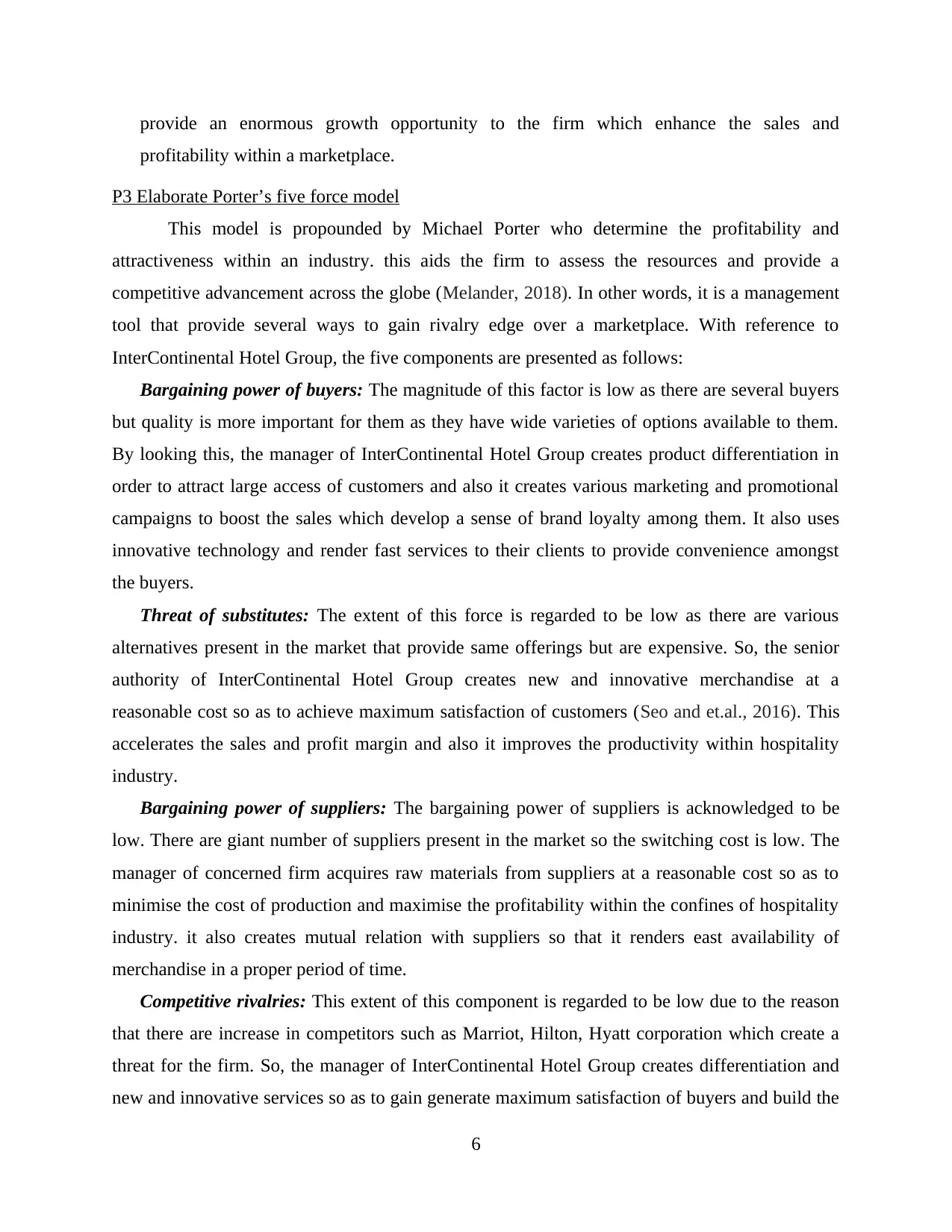
provide an enormous growth opportunity to the firm which enhance the sales and
profitability within a marketplace.
P3 Elaborate Porter’s five force model
This model is propounded by Michael Porter who determine the profitability and
attractiveness within an industry. this aids the firm to assess the resources and provide a
competitive advancement across the globe (Melander, 2018). In other words, it is a management
tool that provide several ways to gain rivalry edge over a marketplace. With reference to
InterContinental Hotel Group, the five components are presented as follows:
Bargaining power of buyers: The magnitude of this factor is low as there are several buyers
but quality is more important for them as they have wide varieties of options available to them.
By looking this, the manager of InterContinental Hotel Group creates product differentiation in
order to attract large access of customers and also it creates various marketing and promotional
campaigns to boost the sales which develop a sense of brand loyalty among them. It also uses
innovative technology and render fast services to their clients to provide convenience amongst
the buyers.
Threat of substitutes: The extent of this force is regarded to be low as there are various
alternatives present in the market that provide same offerings but are expensive. So, the senior
authority of InterContinental Hotel Group creates new and innovative merchandise at a
reasonable cost so as to achieve maximum satisfaction of customers (Seo and et.al., 2016). This
accelerates the sales and profit margin and also it improves the productivity within hospitality
industry.
Bargaining power of suppliers: The bargaining power of suppliers is acknowledged to be
low. There are giant number of suppliers present in the market so the switching cost is low. The
manager of concerned firm acquires raw materials from suppliers at a reasonable cost so as to
minimise the cost of production and maximise the profitability within the confines of hospitality
industry. it also creates mutual relation with suppliers so that it renders east availability of
merchandise in a proper period of time.
Competitive rivalries: This extent of this component is regarded to be low due to the reason
that there are increase in competitors such as Marriot, Hilton, Hyatt corporation which create a
threat for the firm. So, the manager of InterContinental Hotel Group creates differentiation and
new and innovative services so as to gain generate maximum satisfaction of buyers and build the
6
profitability within a marketplace.
P3 Elaborate Porter’s five force model
This model is propounded by Michael Porter who determine the profitability and
attractiveness within an industry. this aids the firm to assess the resources and provide a
competitive advancement across the globe (Melander, 2018). In other words, it is a management
tool that provide several ways to gain rivalry edge over a marketplace. With reference to
InterContinental Hotel Group, the five components are presented as follows:
Bargaining power of buyers: The magnitude of this factor is low as there are several buyers
but quality is more important for them as they have wide varieties of options available to them.
By looking this, the manager of InterContinental Hotel Group creates product differentiation in
order to attract large access of customers and also it creates various marketing and promotional
campaigns to boost the sales which develop a sense of brand loyalty among them. It also uses
innovative technology and render fast services to their clients to provide convenience amongst
the buyers.
Threat of substitutes: The extent of this force is regarded to be low as there are various
alternatives present in the market that provide same offerings but are expensive. So, the senior
authority of InterContinental Hotel Group creates new and innovative merchandise at a
reasonable cost so as to achieve maximum satisfaction of customers (Seo and et.al., 2016). This
accelerates the sales and profit margin and also it improves the productivity within hospitality
industry.
Bargaining power of suppliers: The bargaining power of suppliers is acknowledged to be
low. There are giant number of suppliers present in the market so the switching cost is low. The
manager of concerned firm acquires raw materials from suppliers at a reasonable cost so as to
minimise the cost of production and maximise the profitability within the confines of hospitality
industry. it also creates mutual relation with suppliers so that it renders east availability of
merchandise in a proper period of time.
Competitive rivalries: This extent of this component is regarded to be low due to the reason
that there are increase in competitors such as Marriot, Hilton, Hyatt corporation which create a
threat for the firm. So, the manager of InterContinental Hotel Group creates differentiation and
new and innovative services so as to gain generate maximum satisfaction of buyers and build the
6
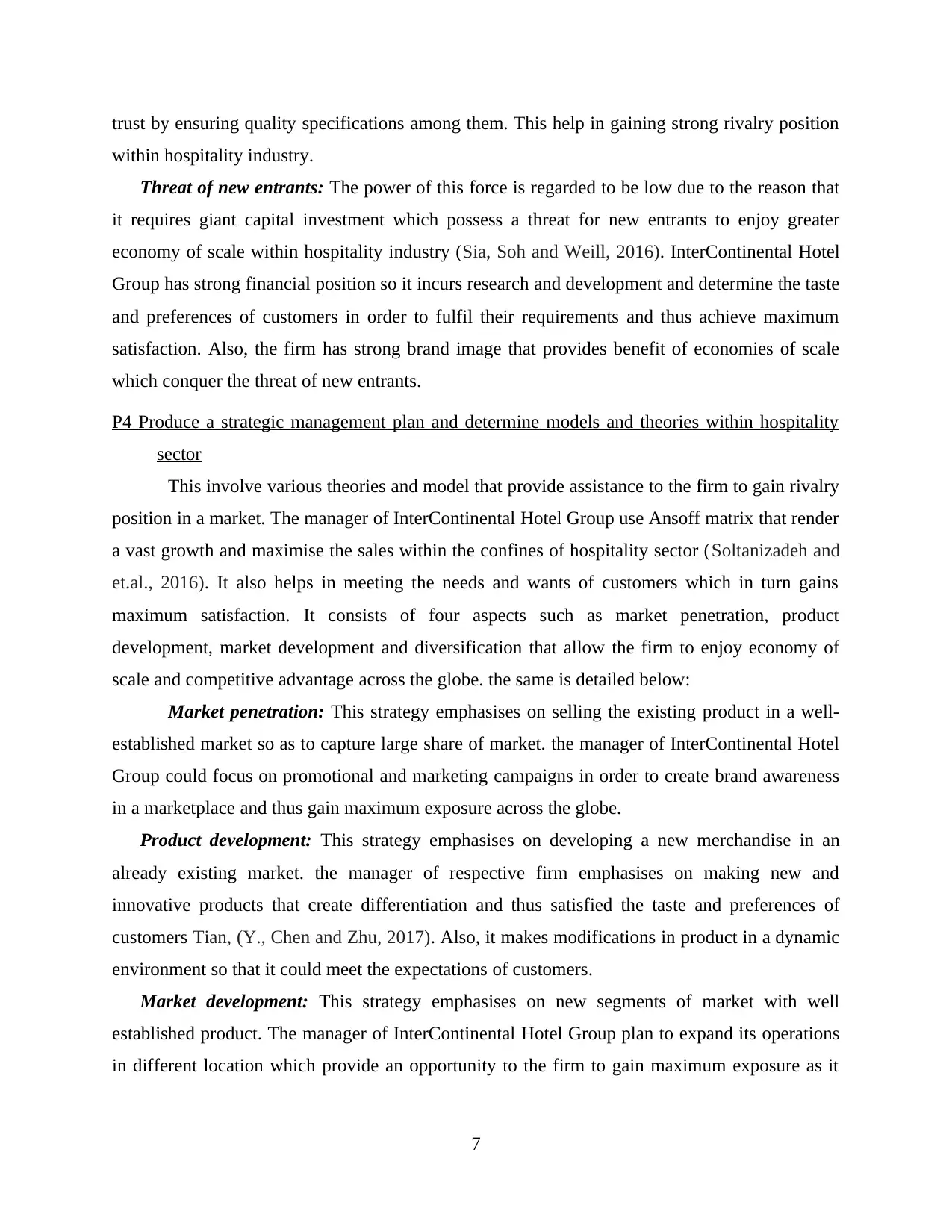
trust by ensuring quality specifications among them. This help in gaining strong rivalry position
within hospitality industry.
Threat of new entrants: The power of this force is regarded to be low due to the reason that
it requires giant capital investment which possess a threat for new entrants to enjoy greater
economy of scale within hospitality industry (Sia, Soh and Weill, 2016). InterContinental Hotel
Group has strong financial position so it incurs research and development and determine the taste
and preferences of customers in order to fulfil their requirements and thus achieve maximum
satisfaction. Also, the firm has strong brand image that provides benefit of economies of scale
which conquer the threat of new entrants.
P4 Produce a strategic management plan and determine models and theories within hospitality
sector
This involve various theories and model that provide assistance to the firm to gain rivalry
position in a market. The manager of InterContinental Hotel Group use Ansoff matrix that render
a vast growth and maximise the sales within the confines of hospitality sector (Soltanizadeh and
et.al., 2016). It also helps in meeting the needs and wants of customers which in turn gains
maximum satisfaction. It consists of four aspects such as market penetration, product
development, market development and diversification that allow the firm to enjoy economy of
scale and competitive advantage across the globe. the same is detailed below:
Market penetration: This strategy emphasises on selling the existing product in a well-
established market so as to capture large share of market. the manager of InterContinental Hotel
Group could focus on promotional and marketing campaigns in order to create brand awareness
in a marketplace and thus gain maximum exposure across the globe.
Product development: This strategy emphasises on developing a new merchandise in an
already existing market. the manager of respective firm emphasises on making new and
innovative products that create differentiation and thus satisfied the taste and preferences of
customers Tian, (Y., Chen and Zhu, 2017). Also, it makes modifications in product in a dynamic
environment so that it could meet the expectations of customers.
Market development: This strategy emphasises on new segments of market with well
established product. The manager of InterContinental Hotel Group plan to expand its operations
in different location which provide an opportunity to the firm to gain maximum exposure as it
7
within hospitality industry.
Threat of new entrants: The power of this force is regarded to be low due to the reason that
it requires giant capital investment which possess a threat for new entrants to enjoy greater
economy of scale within hospitality industry (Sia, Soh and Weill, 2016). InterContinental Hotel
Group has strong financial position so it incurs research and development and determine the taste
and preferences of customers in order to fulfil their requirements and thus achieve maximum
satisfaction. Also, the firm has strong brand image that provides benefit of economies of scale
which conquer the threat of new entrants.
P4 Produce a strategic management plan and determine models and theories within hospitality
sector
This involve various theories and model that provide assistance to the firm to gain rivalry
position in a market. The manager of InterContinental Hotel Group use Ansoff matrix that render
a vast growth and maximise the sales within the confines of hospitality sector (Soltanizadeh and
et.al., 2016). It also helps in meeting the needs and wants of customers which in turn gains
maximum satisfaction. It consists of four aspects such as market penetration, product
development, market development and diversification that allow the firm to enjoy economy of
scale and competitive advantage across the globe. the same is detailed below:
Market penetration: This strategy emphasises on selling the existing product in a well-
established market so as to capture large share of market. the manager of InterContinental Hotel
Group could focus on promotional and marketing campaigns in order to create brand awareness
in a marketplace and thus gain maximum exposure across the globe.
Product development: This strategy emphasises on developing a new merchandise in an
already existing market. the manager of respective firm emphasises on making new and
innovative products that create differentiation and thus satisfied the taste and preferences of
customers Tian, (Y., Chen and Zhu, 2017). Also, it makes modifications in product in a dynamic
environment so that it could meet the expectations of customers.
Market development: This strategy emphasises on new segments of market with well
established product. The manager of InterContinental Hotel Group plan to expand its operations
in different location which provide an opportunity to the firm to gain maximum exposure as it
7
⊘ This is a preview!⊘
Do you want full access?
Subscribe today to unlock all pages.

Trusted by 1+ million students worldwide
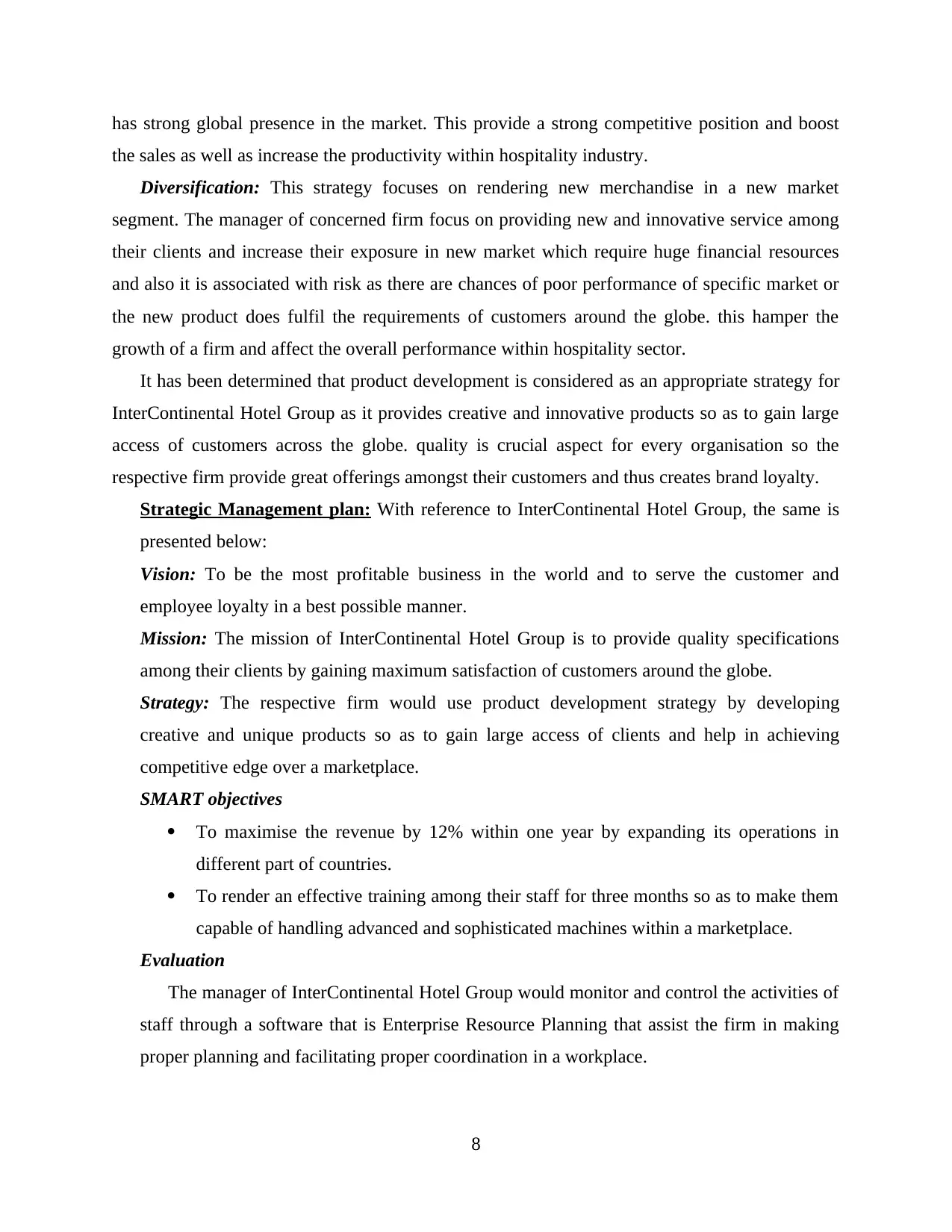
has strong global presence in the market. This provide a strong competitive position and boost
the sales as well as increase the productivity within hospitality industry.
Diversification: This strategy focuses on rendering new merchandise in a new market
segment. The manager of concerned firm focus on providing new and innovative service among
their clients and increase their exposure in new market which require huge financial resources
and also it is associated with risk as there are chances of poor performance of specific market or
the new product does fulfil the requirements of customers around the globe. this hamper the
growth of a firm and affect the overall performance within hospitality sector.
It has been determined that product development is considered as an appropriate strategy for
InterContinental Hotel Group as it provides creative and innovative products so as to gain large
access of customers across the globe. quality is crucial aspect for every organisation so the
respective firm provide great offerings amongst their customers and thus creates brand loyalty.
Strategic Management plan: With reference to InterContinental Hotel Group, the same is
presented below:
Vision: To be the most profitable business in the world and to serve the customer and
employee loyalty in a best possible manner.
Mission: The mission of InterContinental Hotel Group is to provide quality specifications
among their clients by gaining maximum satisfaction of customers around the globe.
Strategy: The respective firm would use product development strategy by developing
creative and unique products so as to gain large access of clients and help in achieving
competitive edge over a marketplace.
SMART objectives
To maximise the revenue by 12% within one year by expanding its operations in
different part of countries.
To render an effective training among their staff for three months so as to make them
capable of handling advanced and sophisticated machines within a marketplace.
Evaluation
The manager of InterContinental Hotel Group would monitor and control the activities of
staff through a software that is Enterprise Resource Planning that assist the firm in making
proper planning and facilitating proper coordination in a workplace.
8
the sales as well as increase the productivity within hospitality industry.
Diversification: This strategy focuses on rendering new merchandise in a new market
segment. The manager of concerned firm focus on providing new and innovative service among
their clients and increase their exposure in new market which require huge financial resources
and also it is associated with risk as there are chances of poor performance of specific market or
the new product does fulfil the requirements of customers around the globe. this hamper the
growth of a firm and affect the overall performance within hospitality sector.
It has been determined that product development is considered as an appropriate strategy for
InterContinental Hotel Group as it provides creative and innovative products so as to gain large
access of customers across the globe. quality is crucial aspect for every organisation so the
respective firm provide great offerings amongst their customers and thus creates brand loyalty.
Strategic Management plan: With reference to InterContinental Hotel Group, the same is
presented below:
Vision: To be the most profitable business in the world and to serve the customer and
employee loyalty in a best possible manner.
Mission: The mission of InterContinental Hotel Group is to provide quality specifications
among their clients by gaining maximum satisfaction of customers around the globe.
Strategy: The respective firm would use product development strategy by developing
creative and unique products so as to gain large access of clients and help in achieving
competitive edge over a marketplace.
SMART objectives
To maximise the revenue by 12% within one year by expanding its operations in
different part of countries.
To render an effective training among their staff for three months so as to make them
capable of handling advanced and sophisticated machines within a marketplace.
Evaluation
The manager of InterContinental Hotel Group would monitor and control the activities of
staff through a software that is Enterprise Resource Planning that assist the firm in making
proper planning and facilitating proper coordination in a workplace.
8
Paraphrase This Document
Need a fresh take? Get an instant paraphrase of this document with our AI Paraphraser
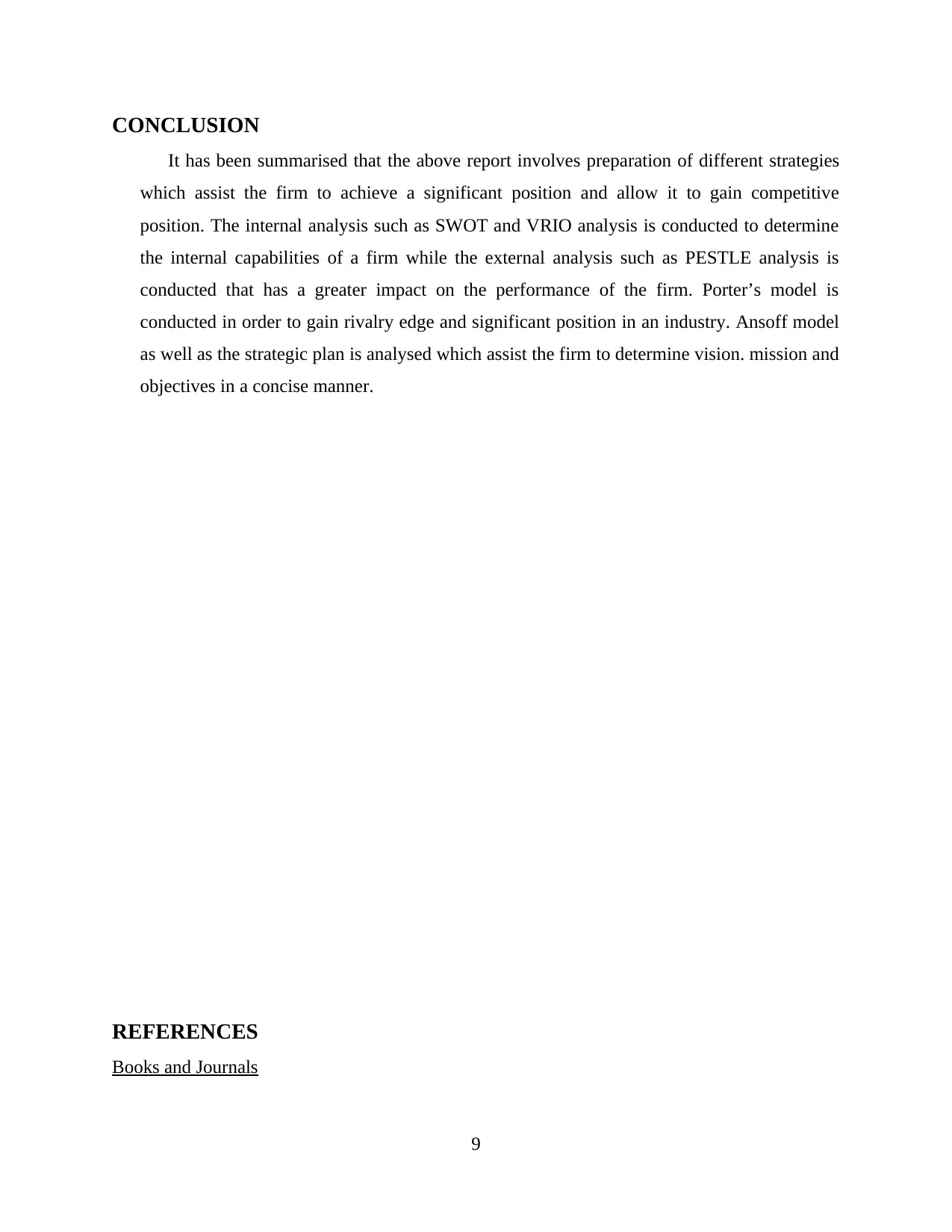
CONCLUSION
It has been summarised that the above report involves preparation of different strategies
which assist the firm to achieve a significant position and allow it to gain competitive
position. The internal analysis such as SWOT and VRIO analysis is conducted to determine
the internal capabilities of a firm while the external analysis such as PESTLE analysis is
conducted that has a greater impact on the performance of the firm. Porter’s model is
conducted in order to gain rivalry edge and significant position in an industry. Ansoff model
as well as the strategic plan is analysed which assist the firm to determine vision. mission and
objectives in a concise manner.
REFERENCES
Books and Journals
9
It has been summarised that the above report involves preparation of different strategies
which assist the firm to achieve a significant position and allow it to gain competitive
position. The internal analysis such as SWOT and VRIO analysis is conducted to determine
the internal capabilities of a firm while the external analysis such as PESTLE analysis is
conducted that has a greater impact on the performance of the firm. Porter’s model is
conducted in order to gain rivalry edge and significant position in an industry. Ansoff model
as well as the strategic plan is analysed which assist the firm to determine vision. mission and
objectives in a concise manner.
REFERENCES
Books and Journals
9
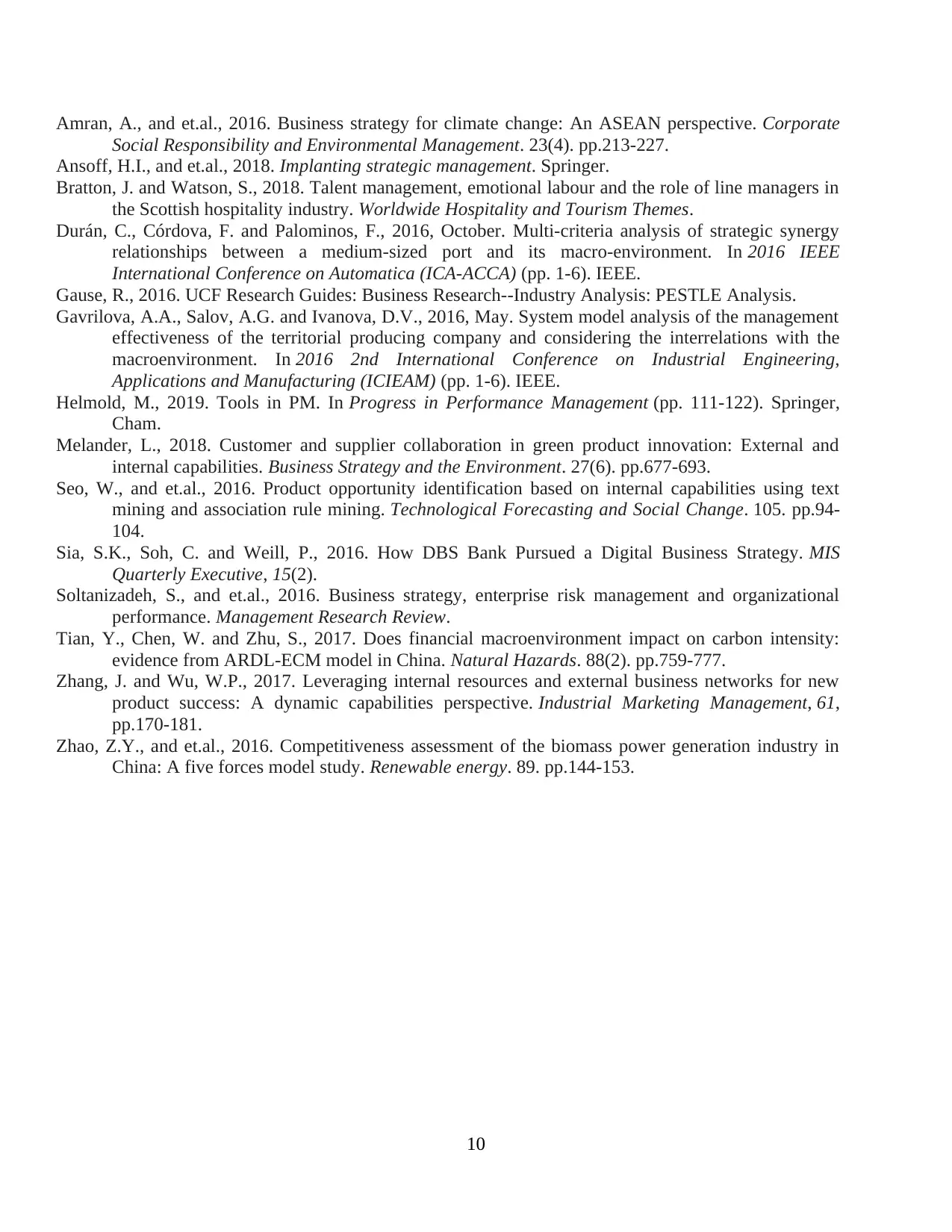
Amran, A., and et.al., 2016. Business strategy for climate change: An ASEAN perspective. Corporate
Social Responsibility and Environmental Management. 23(4). pp.213-227.
Ansoff, H.I., and et.al., 2018. Implanting strategic management. Springer.
Bratton, J. and Watson, S., 2018. Talent management, emotional labour and the role of line managers in
the Scottish hospitality industry. Worldwide Hospitality and Tourism Themes.
Durán, C., Córdova, F. and Palominos, F., 2016, October. Multi-criteria analysis of strategic synergy
relationships between a medium-sized port and its macro-environment. In 2016 IEEE
International Conference on Automatica (ICA-ACCA) (pp. 1-6). IEEE.
Gause, R., 2016. UCF Research Guides: Business Research--Industry Analysis: PESTLE Analysis.
Gavrilova, A.A., Salov, A.G. and Ivanova, D.V., 2016, May. System model analysis of the management
effectiveness of the territorial producing company and considering the interrelations with the
macroenvironment. In 2016 2nd International Conference on Industrial Engineering,
Applications and Manufacturing (ICIEAM) (pp. 1-6). IEEE.
Helmold, M., 2019. Tools in PM. In Progress in Performance Management (pp. 111-122). Springer,
Cham.
Melander, L., 2018. Customer and supplier collaboration in green product innovation: External and
internal capabilities. Business Strategy and the Environment. 27(6). pp.677-693.
Seo, W., and et.al., 2016. Product opportunity identification based on internal capabilities using text
mining and association rule mining. Technological Forecasting and Social Change. 105. pp.94-
104.
Sia, S.K., Soh, C. and Weill, P., 2016. How DBS Bank Pursued a Digital Business Strategy. MIS
Quarterly Executive, 15(2).
Soltanizadeh, S., and et.al., 2016. Business strategy, enterprise risk management and organizational
performance. Management Research Review.
Tian, Y., Chen, W. and Zhu, S., 2017. Does financial macroenvironment impact on carbon intensity:
evidence from ARDL-ECM model in China. Natural Hazards. 88(2). pp.759-777.
Zhang, J. and Wu, W.P., 2017. Leveraging internal resources and external business networks for new
product success: A dynamic capabilities perspective. Industrial Marketing Management, 61,
pp.170-181.
Zhao, Z.Y., and et.al., 2016. Competitiveness assessment of the biomass power generation industry in
China: A five forces model study. Renewable energy. 89. pp.144-153.
10
Social Responsibility and Environmental Management. 23(4). pp.213-227.
Ansoff, H.I., and et.al., 2018. Implanting strategic management. Springer.
Bratton, J. and Watson, S., 2018. Talent management, emotional labour and the role of line managers in
the Scottish hospitality industry. Worldwide Hospitality and Tourism Themes.
Durán, C., Córdova, F. and Palominos, F., 2016, October. Multi-criteria analysis of strategic synergy
relationships between a medium-sized port and its macro-environment. In 2016 IEEE
International Conference on Automatica (ICA-ACCA) (pp. 1-6). IEEE.
Gause, R., 2016. UCF Research Guides: Business Research--Industry Analysis: PESTLE Analysis.
Gavrilova, A.A., Salov, A.G. and Ivanova, D.V., 2016, May. System model analysis of the management
effectiveness of the territorial producing company and considering the interrelations with the
macroenvironment. In 2016 2nd International Conference on Industrial Engineering,
Applications and Manufacturing (ICIEAM) (pp. 1-6). IEEE.
Helmold, M., 2019. Tools in PM. In Progress in Performance Management (pp. 111-122). Springer,
Cham.
Melander, L., 2018. Customer and supplier collaboration in green product innovation: External and
internal capabilities. Business Strategy and the Environment. 27(6). pp.677-693.
Seo, W., and et.al., 2016. Product opportunity identification based on internal capabilities using text
mining and association rule mining. Technological Forecasting and Social Change. 105. pp.94-
104.
Sia, S.K., Soh, C. and Weill, P., 2016. How DBS Bank Pursued a Digital Business Strategy. MIS
Quarterly Executive, 15(2).
Soltanizadeh, S., and et.al., 2016. Business strategy, enterprise risk management and organizational
performance. Management Research Review.
Tian, Y., Chen, W. and Zhu, S., 2017. Does financial macroenvironment impact on carbon intensity:
evidence from ARDL-ECM model in China. Natural Hazards. 88(2). pp.759-777.
Zhang, J. and Wu, W.P., 2017. Leveraging internal resources and external business networks for new
product success: A dynamic capabilities perspective. Industrial Marketing Management, 61,
pp.170-181.
Zhao, Z.Y., and et.al., 2016. Competitiveness assessment of the biomass power generation industry in
China: A five forces model study. Renewable energy. 89. pp.144-153.
10
⊘ This is a preview!⊘
Do you want full access?
Subscribe today to unlock all pages.

Trusted by 1+ million students worldwide
1 out of 12
Related Documents
Your All-in-One AI-Powered Toolkit for Academic Success.
+13062052269
info@desklib.com
Available 24*7 on WhatsApp / Email
![[object Object]](/_next/static/media/star-bottom.7253800d.svg)
Unlock your academic potential
Copyright © 2020–2026 A2Z Services. All Rights Reserved. Developed and managed by ZUCOL.





